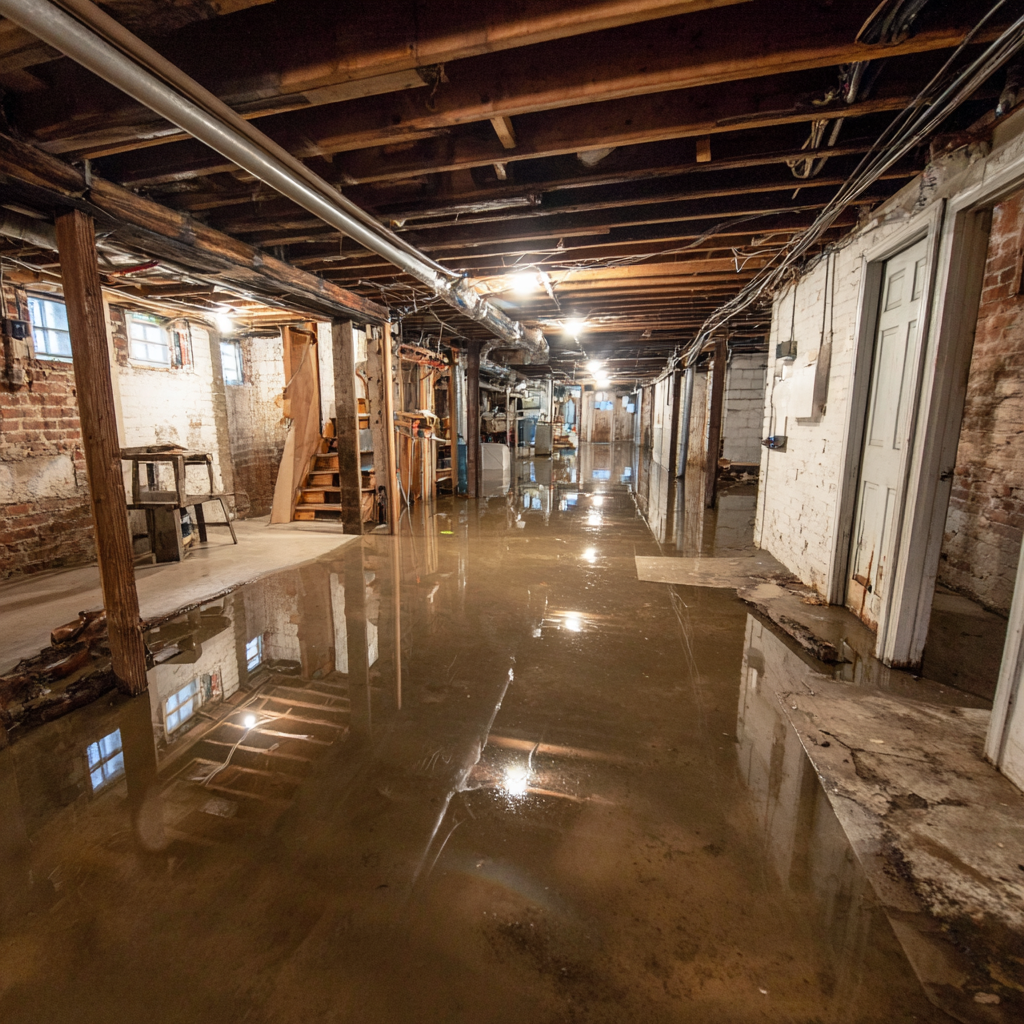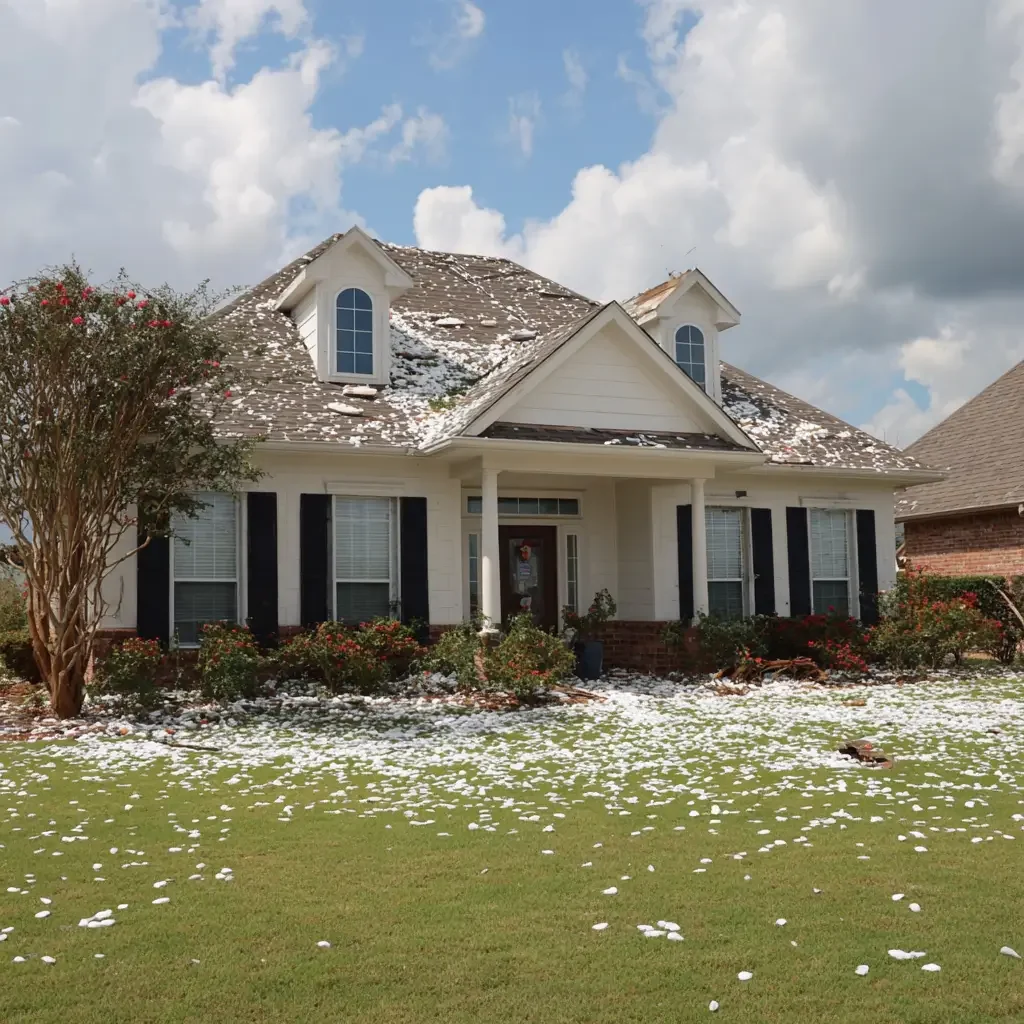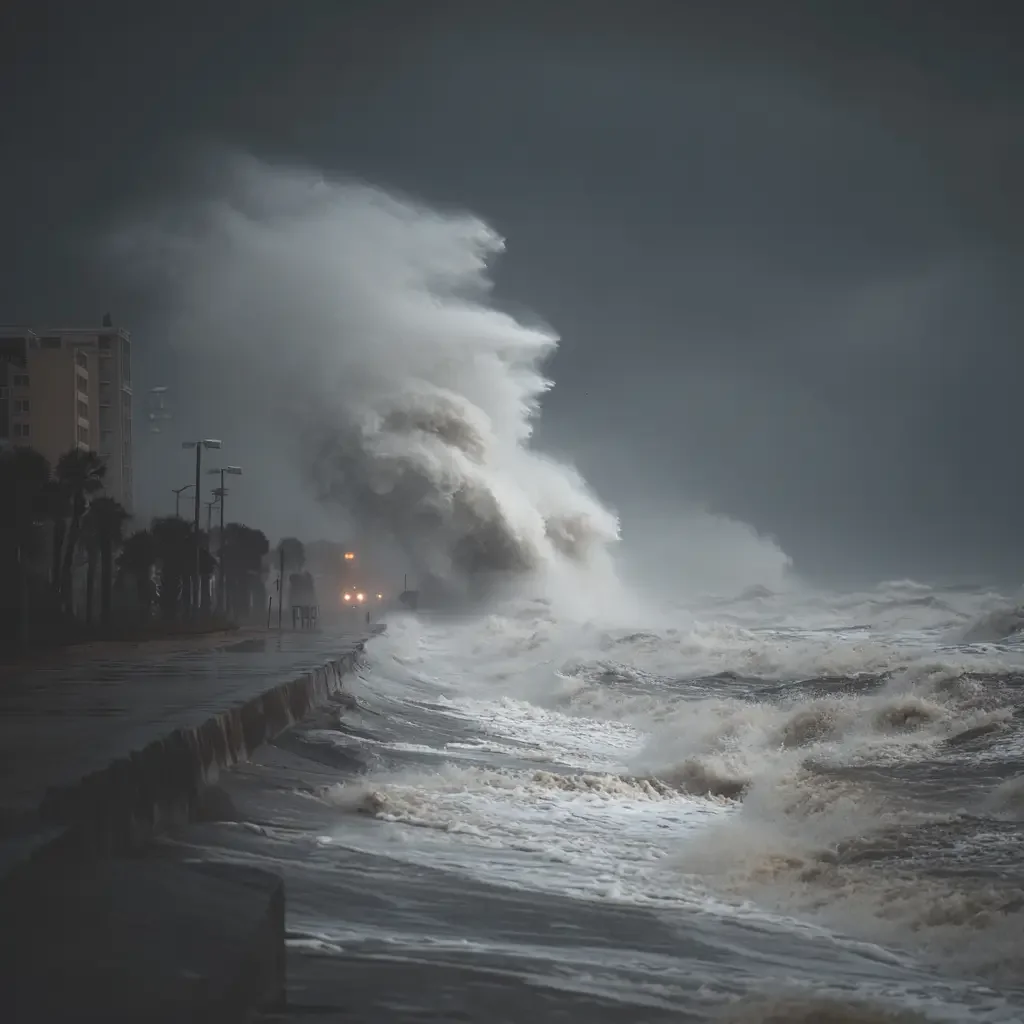Does Renters Insurance Cover Flooded Basements?
TLDR: Flooded Basement? What Renters Insurance Really Covers
Standard renters insurance does not cover flood damage from outside sources like hurricanes or heavy rain.
It may cover water damage from internal issues like burst pipes or leaking appliances.
Sewer backup and sump pump failure are excluded unless you purchase add-on coverage.
Flood insurance is a separate, essential policy if you live in a high-risk zone.
A public adjuster works for you to manage claims, maximize your settlement, and fight insurance company denials.
It’s a renter's worst nightmare: a musty smell leads you downstairs, where you’re met with the shocking sight of your belongings floating in murky, contaminated water. The initial shock quickly turns to panic as the financial and emotional weight of the situation sets in. Family heirlooms, expensive electronics, and stored memories are all at risk. In that moment, a single, urgent question floods your mind: Am I covered?
When it comes to renters insurance, the answer to the critical question, "does renters insurance cover flooded basements?" is complex and depends entirely on the source of the water. It’s almost never a simple "yes" or "no." Insurance policies are built on a foundation of "covered perils," and the distinction between a burst pipe and a rainstorm is the difference between a paid claim and a devastating financial loss.
This in-depth guide will break down exactly what renters insurance covers, what it excludes, and the crucial steps you need to take to protect yourself financially. We'll pay special attention to the unique risks in flood-prone states like Florida, Minnesota, and Wisconsin, and explain how a public adjuster can be your most valuable asset during a claim.
The Bottom Line: Does Renters Insurance Cover Flooded Basements?
Standard renters insurance does NOT cover damage from natural flooding (e.g., heavy rain, hurricanes, storm surge). However, it MAY cover water damage from internal sources, like a burst pipe or a malfunctioning appliance. Sewer backups are also typically excluded unless you have a specific add-on. This distinction is the single most important factor in determining your coverage.
The Critical Difference: Water Damage vs. Flood Damage
Insurance companies draw a hard, legally binding line between "water damage" and "flood damage." Understanding this distinction is the key to knowing your rights and your coverage.
Covered Water Damage (Usually)
Your standard renters insurance policy likely covers damage from water that is considered "sudden and accidental" and originates from within the building. These are common "covered perils."
Burst Pipes: A classic example. A pipe can burst due to freezing temperatures in a Minnesota winter, or simply due to age and corrosion. If this happens and your basement floods, your policy should cover the damage to your personal property.
Appliance Malfunctions: This includes more than just washing machines. A leaking water heater, a broken dishwasher hose, or a faulty ice maker line in your refrigerator can all release significant amounts of water. As long as the failure was not due to your own negligence (e.g., failing to perform basic maintenance), your belongings should be covered.
Accidental Overflows: A toilet backs up unexpectedly, a sink is left running by mistake, or a bathtub overflows. These common household mishaps are typically covered.
Fire Extinguishing: If a fire occurs in your building, the water damage caused by sprinklers or firefighter hoses is almost always covered as part of the fire claim.
These events fall under your policy's Personal Property Coverage, which helps you repair or replace your damaged belongings up to your policy limit.
Excluded Flood Damage (Almost Always)
Standard renters policies explicitly exclude damage from water that originates from outside your rental unit. This is the definition of a "flood" in insurance terms.
Natural Disasters: This is the broadest and most common exclusion. It includes hurricanes and tropical storms in Florida, flash floods from rapid snowmelt in Wisconsin, and overflowing rivers in Minnesota. Any water that enters your home from these events is not covered by a standard policy.
Heavy Rainstorms: If a torrential downpour saturates the ground and water seeps into your basement through the foundation, windows, or doors, it is considered flooding and is not covered.
Sewer Backups: This is a crucial and often misunderstood exclusion. If the municipal sewer system is overwhelmed by rain and raw sewage backs up through your drains, the resulting damage is not covered by a standard policy. This requires a specific endorsement.
Groundwater Seepage: Water from naturally high groundwater levels that is pushed into the basement through cracks in the foundation is considered a flood-related event and is excluded.
To cover these external events, you need a separate, dedicated flood insurance policy.
How to Bridge the Coverage Gap: Flood Insurance & Endorsements
If your standard policy has these significant gaps, how do you protect yourself?
Flood Insurance: This is the most important safeguard. You can purchase a separate flood insurance policy for your personal belongings through the National Flood Insurance Program (NFIP), which is managed by FEMA, or through a growing number of private insurers. A key point for renters is that you only need to insure your contents, not the building itself, making it far more affordable than a homeowner's policy. Even if you don't live in a high-risk zone, more than 20% of all flood claims occur in low-to-moderate risk areas.
Sewer Backup Coverage: This is an inexpensive but vital add-on (or "rider") to your existing renters insurance policy. For a small additional premium, this rider provides thousands of dollars in coverage for damage caused by sump pump failure or a municipal sewer backup. Given the high cost of cleaning up and replacing items damaged by contaminated water, this is one of the best investments a renter can make.
Scheduled Personal Property: If you store high-value items in your basement—such as a home office setup with expensive computers, a musical instrument collection, or valuable artwork—a standard policy's sub-limits might not be enough. A "scheduled property" rider allows you to insure specific high-value items for their full appraised value, ensuring you can be made whole after a loss.
Your Immediate 7-Step Action Plan for a Flooded Basement
If you're facing a flooded basement, act quickly and safely to protect yourself and your claim.
Prioritize Safety: Never enter a flooded area until you are certain the electricity has been shut off at the breaker. The risk of electrocution is severe. If you smell gas or suspect a leak, leave the property immediately and call 911.
Stop the Water: If the source is internal (like a burst pipe), locate and shut off the main water valve to the building to prevent further damage.
Contact Your Landlord: The building's structure and any building-owned appliances (like a water heater) are their responsibility. Inform them of the situation immediately in writing (an email or text is fine) to create a paper trail.
Document Everything: Before moving or cleaning anything, document the scene thoroughly. Take wide-angle photos and videos of the entire area, and then close-up shots of all damaged items. This visual evidence is your most powerful tool in the claims process.
Notify Your Insurance Provider: Call your agent or the insurance company's 24/7 claims hotline to report the damage. Be prepared to give a clear and accurate description of what happened and the source of the water.
Protect Property from Further Damage: If it's safe, move undamaged or salvageable items to a dry, secure location. You have a duty under your policy to mitigate further damage, which can include removing standing water with a shop-vac or pump and setting up fans and dehumidifiers to start the drying process.
Call a Public Adjuster: If the damage is significant, if the cause is unclear, or if your insurer immediately seems dismissive or difficult, contact a licensed public adjuster. Getting an expert on your side from the beginning is the best way to protect your interests.
Why You Shouldn't Face the Insurance Company Alone
After a loss, your insurance company will assign their own adjuster to your case. Their adjuster is a trained professional whose job is to represent the insurance company's financial interests. A public adjuster is a licensed and bonded professional who works exclusively for you, the policyholder.
At Shoreline Public Adjusters, we level the playing field. We understand the complex language of insurance policies and the tactics companies use to delay, deny, or underpay claims. We handle every aspect of your claim:
In-depth Policy Review: We analyze your policy to identify all avenues for coverage.
Comprehensive Damage Documentation: We create a detailed, itemized inventory of every single damaged item, accurately valuing what it will cost to replace them.
Claim Submission & Negotiation: We formally present your claim to the insurance company and handle all communications and negotiations, fighting to secure the maximum settlement you are rightfully owed.
We specialize in residential flood, fire, and storm claims across Florida, Minnesota, and Wisconsin, ensuring you can rebuild without the stress of fighting a legal and financial battle alone.
State-Specific Flood Risks: FL, MN, & WI
Florida: The primary risks are hurricanes and tropical storms, which bring devastating storm surge to coastal areas. However, inland areas also face significant risk from extreme rainfall events that overwhelm drainage systems.
Minnesota: Known as the "Land of 10,000 Lakes," Minnesota faces flood risks from heavy spring snowmelt causing widespread river flooding, as well as severe summer thunderstorms that can produce flash floods with little warning.
Wisconsin: Flash flooding from intense summer rains and rapid spring snowmelt can overwhelm drainage systems and flood basements, particularly in the hilly, river-carved "Driftless Area" in the southwestern part of the state.
Frequently Asked Questions (FAQ)
Q: So, does renters insurance cover flooded basements? A: In short, only when the water comes from a sudden and accidental internal source like a burst pipe. For flooding from natural disasters, heavy rain, or sewer backups, you need separate flood insurance or a specific policy add-on.
Q: What if my landlord's negligence caused the flood? A: If a landlord's failure to maintain the property (e.g., not fixing a known leaky pipe) caused the damage, you may be able to file a claim against their liability insurance. However, your own renters insurance would still be your first line of defense for your personal belongings, and your insurer might then seek reimbursement from the landlord's insurer in a process called subrogation.
Q: Does renters insurance cover mold after a flood? A: It depends. If the mold is a direct result of a covered water damage event (like a burst pipe) and you acted promptly to mitigate the damage, you may have limited coverage for remediation. Mold from a non-covered event (like a natural flood) would not be covered.
Q: Is flood insurance expensive for a renter? A: Flood insurance for a renter's personal property is often much more affordable than for a homeowner, as it doesn't cover the building itself. Depending on your location and the amount of coverage you need, a policy can often be secured for a few hundred dollars a year. The peace of mind is well worth the cost.
Don't Wait for a Disaster to Strike
The time to understand your policy is now, not when you're standing in an inch of water. A proactive review of your coverage can save you thousands of dollars and immense stress.
Review Your Policy: Read your declarations page and understand your coverage limits and exclusions.
Get Flood Insurance: Go to the NFIP website or speak with an agent. Don't assume you're not at risk.
Add Endorsements: Call your provider today and ask about adding sewer backup coverage. It's an inexpensive and powerful protection.
If your basement has flooded, don't navigate the complex and often adversarial claims process alone. Contact Shoreline Public Adjusters today for a free, no-obligation consultation. We’re here to fight for you.
Shoreline Public Adjusters, LLC
780 Fifth Avenue South
Suite #200
Naples, FL 34102Email: hello@teamshoreline.com
Phone: 954-546-1899
Fax: 239-778-9889



Pensacola homeowners often confuse water damage and flood damage on insurance claims. Learn why it matters, what's covered, and how to protect your payout.